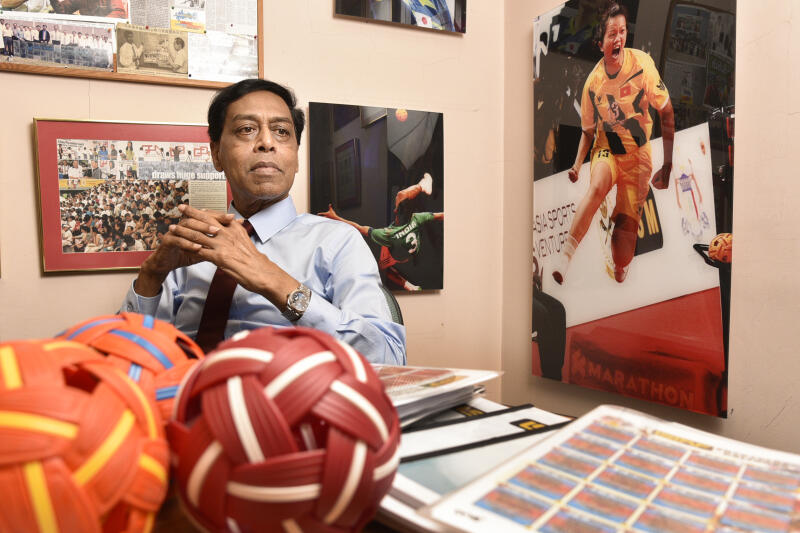Sepak takraw: Out of Perses, but stalwart Abdul Halim eyes Olympic berth for sport
Sign up now: Get the biggest sports news in your inbox

Abdul Halim Kader, former Singapore Sepaktakraw Federation (Perses) president.
ST PHOTO: DESMOND WEE
SINGAPORE - Over the past four decades, Abdul Halim Kader has become almost synonymous with the sport of sepak takraw in Singapore.
For the last four months though, the 69-year-old has had to grapple with the unfamiliarity of not holding a leadership position in the sport's national body, Perses, for the first time since he was appointed its general secretary in 1982.
He stayed in the post until 1999 before he was elected the association's president from 2000, a role he held for almost 20 years, except for a spell from 2013-2015 when he served again as general secretary.
But last November, Halim was ousted as president after the federation's affiliates voted 12-9 in favour of his deputy, Nasri Haron.
When The Straits Times visited him at his office at Bedok Reservoir Road, Halim appeared relaxed and insisted he was at ease with his surprise exit.
"In an election, you can have ups and downs," he said. "The way I look at it, it's not as though a rival or outsider came in and stole (the presidency)... Nasri is a person whom I brought into Perses (in 2013), so I wish him well. We should look forward now."
Halim's reign as Perses president saw a slump in Singapore's performance at the regional and international level.
In 10 editions of the biennial SEA Games from 2001 to 2019, sepak takraw only enjoyed medal returns in three, yielding a total of one silver and nine bronze medals. The sport failed to earn a ticket twice, in 2009 and 2017.
Nasri, 60, a state prosecuting officer in the Attorney-General's Chambers, noted Halim's long involvement in the sport but added: "The affiliates felt Perses needed to move on without him... My only goal is to bring local sepak takraw forward."
While he may be out of the Singapore scene, Halim still holds key roles in the sport at the international level. He is president of the Asian Sepak Takraw Federation (Astaf), and general secretary of the international federation, Istaf.
He has ambitious plans for the sport, and his eyes lit up when discussing getting sepak takraw into the Olympic programme by 2032, a goal derided by some as a leap too far.
But Halim was undeterred.
Sitting in his office with portraits of players from Japan, Hong Kong and South Korea on his wall, he said: "Takraw is no longer just a kampong (village) game. It is now a global one."
He has pushed for sepak takraw's Olympic inclusion since the mid-1990s. Istaf even changed the sport's name to "acrovolley" for a period, hoping to piggyback on volleyball and be included as a medal event at the 2000 Sydney Olympics, but the effort proved fruitless.
But Halim is hopeful his current efforts will find success, as he pointed to the International Olympic Committee's (IOC) announcement last July that it had reached agreements with Istaf and five other international sports bodies to collaborate on content with the Olympic Channel. This provides a platform for the promotion of sports and athletes within the Olympic movement.
However, this is by no means a green light to a future berth at the Olympics - after all, the Olympic Charter indicates that in order to be accepted, a sport must be widely practised by men in at least 75 countries and on four continents, and by women in no fewer than 40 countries and on three continents.
Istaf presently has 50 member nations, 13 of which are still on provisional status.
But, ever the optimist, Halim said earnestly: "We started our dialogue with the IOC three years ago and this is the first clear recognition we've got from them."
Even as he prepares to celebrate the birth of his 10th grandchild next week, it is clear the veteran sports administrator has not lost any of the zeal or energy that earned him the Public Service Medal (PBM) in 1987 and the Public Service Star (BBM) in 1997 for his contributions to the community.
He said: "I want to get the pathway right for sepak takraw to be included at the Olympics... Whoever runs Istaf by then does not matter to me."


